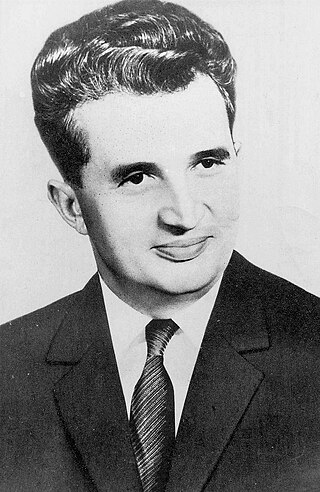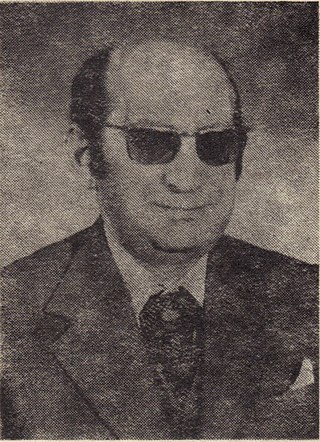Related Research Articles

Nicolae Ceaușescu was a Romanian politician who was the second and last communist leader of Romania, serving as the general secretary of the Romanian Communist Party from 1965 to 1989. Widely classified as a dictator, he was the country's head of state from 1967 to 1989, serving as President of the State Council from 1967 and as the first President of the Republic from 1974. He was overthrown and executed in the Romanian Revolution in December 1989 along with his wife Elena Ceaușescu, as part of a series of anti-communist uprisings in Eastern Europe that year.

The Socialist Republic of Romania was a Marxist–Leninist one-party socialist state that existed officially in Romania from 1947 to 1989. From 1947 to 1965, the state was known as the Romanian People's Republic. The country was an Eastern Bloc state and a member of the Warsaw Pact with a dominant role for the Romanian Communist Party enshrined in its constitutions. Geographically, RSR was bordered by the Black Sea to the east, the Soviet Union to the north and east, Hungary and Yugoslavia to the west, and Bulgaria to the south.

The Department of State Security, commonly known as the Securitate, was the secret police agency of the Socialist Republic of Romania. It was founded on 30 August 1948 from the Siguranța with help and direction from the Soviet MGB.

The Romanian revolution was a period of violent civil unrest in Romania during December 1989 as a part of the revolutions of 1989 that occurred in several countries around the world, primarily within the Eastern Bloc. The Romanian revolution started in the city of Timișoara and soon spread throughout the country, ultimately culminating in the drumhead trial and execution of longtime Romanian Communist Party (PCR) General Secretary Nicolae Ceaușescu and his wife Elena, and the end of 42 years of Communist rule in Romania. It was also the last removal of a Marxist–Leninist government in a Warsaw Pact country during the events of 1989, and the only one that violently overthrew a country's leadership and executed its leader; according to estimates, over one thousand people died and thousands more were injured.
Digital anthropology is the anthropological study of the relationship between humans and digital-era technology. The field is new, and thus has a variety of names with a variety of emphases. These include techno-anthropology, digital ethnography, cyberanthropology, and virtual anthropology.
Antonie Plămădeală was a high-level hierarch of the Romanian Orthodox Church, the Orthodox Metropolitan of Transylvania (1982–2005).

Ilie Ceaușescu was a Romanian army general and communist politician who was Deputy Defence Minister of Communist Romania during the rule of his older brother, Nicolae Ceaușescu.
Sherry Beth Ortner is an American cultural anthropologist and has been a Distinguished Professor of Anthropology at UCLA since 2004.

The July Theses was a speech delivered by Nicolae Ceaușescu to the executive committee of the Romanian Communist Party (PCR) on 6 July 1971.

Zigu Ornea was a Romanian cultural historian, literary critic, biographer and book publisher. The author of several monographs focusing on the evolution of Romanian culture in general and Romanian literature in particular, he chronicled the debates and meeting points between conservatism, nationalism, and socialism. His main early works are primarily dedicated to the 19th and early 20th century cultural and political currents heralded by Junimea, by the left-wing ideologues of Poporanism and by the Sămănătorul circle, followed independently or in relation to one another. Written as expansions of this study were Ornea's biographical essays on some of the period's leading theorists: Titu Maiorescu, Constantin Dobrogeanu-Gherea and Constantin Stere.
Noël Bernard was a Romanian journalist, known for being the head of the Romanian-language department of Radio Free Europe (RFE). His mysterious death is believed by some to have been caused by Communist Romania's secret police, the Securitate, which is known to have previously sought to "neutralise" him.
Kay Barbara Warren is an American academic anthropologist, known for her extensive research and publications in cultural anthropology studies. Initially trained as an anthropologist specializing in field studies of Latin American and Mesoamerican indigenous cultures, Warren has also written and lectured on an array of broader anthropological topics. These include studies about the impacts on politically marginalized and indigenous communities of social movements, wars and political violence, transnationalism, and foreign aid programs. As of 2009 Warren holds an endowed chair as the Charles C. Tillinghast Jr. ’32 Professor in International Studies at Brown University,. Before joining the faculty at Brown in 2003, Warren held professorships at both Harvard and Princeton universities.

Nicolae Pleșiță was a Romanian intelligence official and secret police investigator. From 1980 to 1984, he led the Foreign Intelligence Service of the Securitate, the secret service of Communist Romania. He was described by the New York Times and Associated Press at the time of his death as "a die-hard Communist and ruthless chief of the Securitate secret police."
Mona Octavia Muscă is a Romanian philologist and politician. A former member of the National Liberal Party (PNL) and of the Liberal Democratic Party (PLD), she was a member of the Romanian Chamber of Deputies for Caraș-Severin County from 1996 to 2004 and for Bucharest from 2004 to 2007. In the Călin Popescu-Tăriceanu cabinet, she served as Minister of Culture and Religious Affairs from 2004 to 2005.

Kristen Rogheh Ghodsee is an American ethnographer and Professor of Russian and East European Studies at the University of Pennsylvania. She is primarily known for her ethnographic work on post-Communist Bulgaria as well as being a contributor to the field of postsocialist gender studies. She was critical of the role of Western feminist nongovernmental organizations doing work among East European women in the 1990s. She has also examined the shifting gender relations of Muslim minorities after Communist rule, the intersections of Islamic beliefs and practices with the ideological remains of Marxism–Leninism, communist nostalgia, the legacies of Marxist feminism, and the intellectual history of utopianism.

Alexandru Drăghici was a Romanian communist activist and politician. He was Interior Minister in 1952 and from 1957 to 1965, and State Security Minister from 1952 to 1957. In these capacities, he exercised control over the Securitate secret police during a period of active repression against other Communist Party members, anti-communist resistance members and ordinary citizens.

National communism in Romania is a term referring to a form of nationalism promoted in the Socialist Republic of Romania between the early 1960s and 1989; the term itself was not used by the Communist regime. Having its origins in Gheorghe Gheorghiu-Dej's political emancipation from the Soviet Union, it was greatly developed by Nicolae Ceaușescu, who began in 1971, through his July Theses manifesto, a national cultural revolution. Part of the national mythology was Nicolae Ceaușescu's cult of personality and the idealization of Romanian history, known in Romanian historiography as protochronism.

Dissent in Romania under Nicolae Ceaușescu describes the voicing of disagreements with the government policies of Communist Romania during the totalitarian rule of Nicolae Ceaușescu after the July Theses in 1971. Because of Ceaușescu's extensive secret police and harsh punishments, open dissent was rare. Notable acts of dissent include Paul Goma's 1977 letters to Ceaușescu, the founding of SLOMR in 1979 and a number of work conflicts, such as the Jiu Valley miners' strike of 1977 and the Braşov Rebellion of 1987.

The Romanian Orthodox Church operated within Communist Romania between 1947 and 1989, the era during which Romania was a socialist state. The regime's relationship with the Orthodox Church was ambiguous during this period: while the government declared itself "atheist", it actively collaborated with the Church, and, during the Nicolae Ceaușescu era, the government used the Orthodox Church as part of his promotion of national identity.
Postsocialism is the academic study of states after the fall or decline of socialism, especially in Eastern Europe and Asia. The "socialism" in postsocialism is not based on a Marxist conception of socialism but rather, especially in the Eastern European context, on the idea of "actually existing socialism". Scholars of postsocialist states maintain that, even if the political and economic systems in place did not adhere to orthodox Marxist ideas of "socialism", these systems were real and had real effects on cultures, society, and individuals' subjectivities. Scholars of postsocialism often draw from other theoretical frameworks like postcolonialism and focus especially on the evolution of labor relations, gender roles, and ethnic and religious political affiliations. The idea of postsocialism has also been criticized, however, for placing so much emphasis on the impact of socialism while the term socialism remains difficult to define, especially if extended beyond Eastern Europe.
References
- ↑ "Verdery, Katherine". worldcat.org. Retrieved December 2, 2016.
- ↑ "Katherine Verdery". cuny.edu. Retrieved December 2, 2016.
- ↑ Neal Ascherson, "Don’t imagine you’re smarter", London Review of Books, 19 July 2018.